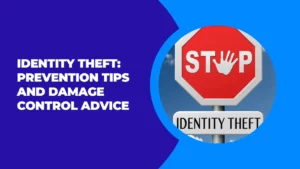Physical Address
304 North Cardinal St.
Dorchester Center, MA 02124
Physical Address
304 North Cardinal St.
Dorchester Center, MA 02124

In today’s world, we rely heavily on technology to store our personal information. From banking details to social security numbers, our lives are stored online. While this makes life easier, it also puts us at risk of identity theft. Identity theft is when someone steals your personal information to commit fraud or other crimes.
It can happen to anyone and the consequences can be devastating. In this blog post, we will discuss the emerging trends and threats in identity theft for 2024. We will explore how identity theft occurs, the financial and emotional implications of it, and how you can recognize the signs of identity theft.
Additionally, we will provide tips on how to prevent identity theft through best practices for online safety and regular credit monitoring. Lastly, we will provide damage control advice on what steps you should take if your identity is stolen to minimize the impact it may have on your life.
Identity theft remains a significant threat in today’s digital age, with advances in technology making it easier for criminals to target individuals. To protect yourself, it’s crucial to safeguard your personal information and stay informed about the latest trends and threats. Educate yourself on different types of fraud to recognize potential risks.

With the increasing use of mobile devices, cybercriminals are finding new opportunities for identity theft. Data breaches continue to be a major source of stolen personal information, while social media platforms are becoming popular targets.
Fake job postings and phishing scams are on the rise, and biometric data theft is a growing concern. Protect yourself by staying informed and taking the necessary precautions.
Identity theft occurs through various channels, both online and offline. Techniques such as phishing emails, fake websites, skimming devices, and stealing physical documents are employed by identity thieves. They also use social engineering to deceive individuals and obtain sensitive information.
Technology has enabled identity thieves to develop new methods and strategies. Personal information stored on devices can be compromised through malware and hacking attacks. Data breaches expose sensitive data, making individuals vulnerable to identity theft.
Cybercriminals can intercept online shopping and banking transactions. Mobile apps and social media platforms may collect and misuse personal data.

Identity thieves employ various techniques to steal personal information. They use phishing scams to deceive individuals and obtain sensitive data. Social engineering tactics are also used to gain trust and access to personal information.
Dumpster diving and mail theft provide physical documents and credit card statements. Stealing wallets or purses gives them access to IDs and credit cards, while they create fraudulent accounts using stolen personal information.
The implications of identity theft can be devastating. Victims face severe financial consequences, requiring a lengthy and complex process to restore credit and resolve issues. Emotional distress and anxiety are common among those affected.
Moreover, identity theft can tarnish an individual’s reputation and strain personal relationships. Resolving these cases often involves legal assistance and collaboration with law enforcement.
Identity theft can lead to unauthorized charges and financial loss, making it difficult for victims to secure credit or loans. The emotional toll includes stress, fear, and a sense of violation.
It can damage credit scores and hinder future financial opportunities, and recovering stolen funds and restoring stability can be challenging.
Unexplained withdrawals or charges on bank accounts or credit card statements, unfamiliar bills for accounts or services, errors or inconsistencies on credit reports, unexpected denials of credit or loans, and notifications from the IRS or other agencies about suspicious activity are signs of identity theft. Stay vigilant against this type of fraud to protect yourself.

Protecting your personal information is crucial in preventing identity theft. Use strong passwords and enable two-factor authentication for added security. Be cautious when sharing sensitive information online or over the phone.
Regularly monitor your financial accounts and credit reports. Shred documents with personal information before discarding them. Keep your devices updated with security patches and antivirus software.
When it comes to online safety, there are some best practices you should follow. These include only providing personal information on secure websites with HTTPS encryption and using unique and complex passwords for each online account.
It’s important to be cautious of unsolicited emails, text messages, or phone calls asking for personal information. Enable automatic software updates on your devices to stay protected against vulnerabilities and avoid clicking on suspicious links or downloading files from unknown sources.
Regularly monitoring your credit is crucial for detecting identity theft at an early stage. Credit monitoring services offer alerts for suspicious activity and even provide identity theft insurance. By monitoring your credit, you can quickly respond and resolve any potential issues, making it an essential part of comprehensive identity theft prevention.
If your identity is stolen, take immediate action. Contact your bank and credit card companies to freeze accounts, place a fraud alert on your credit report with the major bureaus, file a report with the FTC and local law enforcement agencies, and keep detailed records of all related conversations and transactions.
In conclusion, identity theft will continue to be a major concern in 2024, with emerging trends and threats in the digital landscape. It is crucial to understand how identity theft occurs and the implications it can have on your finances and emotional well-being.
Prevention is key, and practicing online safety, such as using strong passwords and regularly monitoring your credit, can help reduce the risk of becoming a victim.
However, if your identity is stolen, it is important to take immediate action by contacting the authorities and financial institutions to minimize the damage. Stay vigilant, stay informed, and take proactive steps to protect your personal information in this digital age.